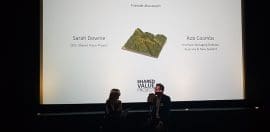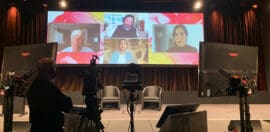‘The most important business story of the last 100 years’

10 March 2021 at 8:28 pm
Beyond Zero tells the story of Interface and the company’s visionary founder Ray Anderson who led them on a quest to stop all negative environmental impacts by 2020. We sat down with director Nathan Havey to find out why he brought the story to the screen.
When first-time filmmaker Nathan Havey encountered Ray Anderson’s story in 2011, it captured his imagination.
Now an emerging leader in the global movement to evolve capitalism, Havey is eager to bring “the most important business story of the last 100 years” to the screen.
Here, we talk to Havey about what makes the Interface story so special; why climate change is a human problem, not a technical problem; and what he hopes other businesses learn from Beyond Zero.
What was it about the Interface story that attracted you?
The Interface story changed my career when I first encountered it in 2011, and it captured my imagination. When I had the chance to meet some of the people at Interface in 2017, and learned all that had happened in the past decade, I was blown away and I wanted to do everything I could to get the word out.
Ethical business seems to be becoming increasingly mainstream. What do you think Ray Anderson would make of where we are at today?
What Interface did takes the concept of ethical business to a fundamental extreme. What most people mean when they use that term is standing by product quality and making sure that a business is not complicit in some of the worst abuses of the business world (child labour, flagrant disregard of environmental laws etc.) But in order to be truly ethical, business must not only “do no harm”, it must rise to meet the moral imperatives of our time.
Ray Anderson saw this in 1994 and I think if he were still around today he would be both heartened by the mainstream embrace of ethical business, and dismayed by the lack of depth and conviction for what is truly ethical at the majority of companies.
Do you think there is enough urgency in the corporate world about the climate emergency?
No. But signs of progress are everywhere. There are 106 months left in this decade, and the corporate world can’t waste any of them. This will be the decade that determines the future state of life on planet earth. The game is not meeting some net zero target by 2030. The game is how far can we go in aligning business and industry with the natural processes that cycle carbon out of the atmosphere and back into the Earth. The more impact we can make on that game, in this decade, the more time we buy our civilisation to achieve sustainability.
How do we change the conversation so that sustainability is not seen as an add-on but as a way of doing business?
I think we have to change the goal to which current and future business leaders aspire. So many business legends are people who built companies or disrupted industries and got really rich. That is success in the archetypal story of business. I believe that story and definition of success is the root of the problem. We need to have business people aspire to be Ray Anderson, not Steve Jobs, to have their “dent in the universe” be something that cultivates a world that works for everyone. At this moment in time, companies don’t need to search for a “dent” they should seek to make their strategic priority – solving climate change is the priority. In the words of Paul Hawken, “What else is there?”

Ray Anderson in the Interface factory.
Do you believe that business can save us?
Not alone it can’t, and conversely we surely can’t be “saved” without business. Businesses can innovate and scale better than any other institution in society, but necessity is the mother of invention, and I believe that government has a huge role to play both in incentivising that innovation, and in making sure the laggards in the business world don’t push the rest of us over the cliff.
What are the key lessons that you hope other corporations take from Beyond Zero?
There are so many lessons that the Interface story can teach us. The most important one is this: Climate change is a human problem, not a technical problem. If individual companies are going to get this right, it will happen not from new technologies, but from 1) engaging and inspiring people throughout the value chain to come up with the innovative ideas that will help humanity turn the corner, and 2) making sure that doing so helps them to meet basic needs for them and their families. Again, paraphrasing Paul Hawken, a farmer who is cutting down rainforest to make room for cattle is not going to stop doing that until it is in his economic self-interest not to.
In that way, the solutions to climate change are intertwined with the solutions to poverty, discrimination, and self determination all over the world. An ethical business finds its way through that complexity to create a business model that delivers strong returns in all of those areas and still makes a healthy financial return.
To quote Ray Anderson, if Interface can do it, anyone can do it, and if anyone can do it, everyone should do it.
What’s the overall impact you are hoping to have with the film?
This film seeks to advance Ray’s audacious vision to create a second industrial revolution, aligning business with ecology once and for all. We’re seeking corporate partners to help us with national premiere events in the world’s top 20 economies, that will not only help us to get this example into board rooms all over the world, but help us make the film and associated education materials available to educators at no cost worldwide. More on all of that at www.BeyondZeroFilm.com
Beyond Zero is currently showing as part of the Transitions Film Festival. To learn more or purchase tickets, head to the Transitions Film Festival website.








Thanks for this article and great to hear that someone is giving Ray Anderson the kudos that he deserves. I can’t tell you how many times I have thought how unfair it was that people make such a big deal of Steve Jobs, when someone like Ray Anderson (who died around the same time) goes unremarked except among those in the know. So to read “We need to have business people aspire to be Ray Anderson, not Steve Jobs” was a breath of fresh air. Hopefully this film can put RA on the pedestal he truly deserves.